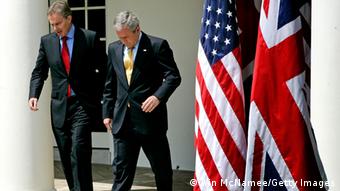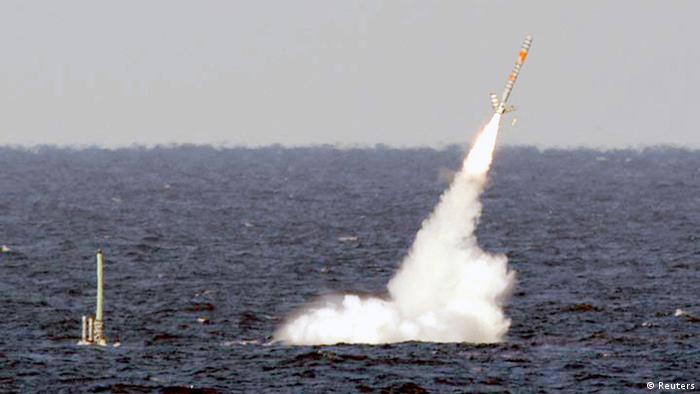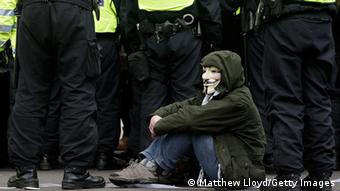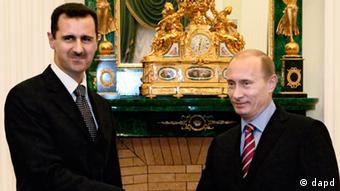As the British government holds close talks with Washington on military intervention in Syria, critics in the UK are warning of a repeat of the 2003 non-UN sanctioned Iraq invasion led by the two Western powers.
Russian and Chinese opposition means a military strike against President Bashar al-Assad’s Syrian government is unlikely to happen with UN backing. Yet throughout this crisis, Washington has been able to rely on the support of the British government.
The extent of this support became clear this week, as British Prime Minister David Cameron broke off his summer holidays, returned to London and declared “the world shouldn’t stand idly by” as chemical weapons were apparently used against Syria’s opposition and civilian population.
Echoes of Iraq
Cameron recalled parliament early to vote on Thursday on what the government calls a punitive military strike against the Syrian leadership. Back in 2003, then Prime Minister Tony Blair did the same to get approval of military action against Saddam Hussain’s Iraq, in the absence of a UN resolution supporting such action.
“I suspect [Cameron] has the same muscular internationalist reactions as Blair did,” Paul Schulte at the Centre for Defense Studies at King’s College in London told DW.
Schulte previously worked as a UN disarmament commissioner in Iraq.
“It’s about saying that world order can be molded, decisive countries can make a difference and Britain should be one of those countries and should join in that effort to affect the evolution of international norms – at least stop them falling back,” he continued.
“You might think that’s arrogant, but it’s quite a widespread attitude in the British political class.”
The so-called special relationship between the UK and US has seen prime ministers from Winston Churchill to Tony Blair – and now David Cameron – back Washington in conflicts including World War II, the Korean War, the Gulf War and the invasions of Iraq and Afghanistan.
Britain is the only country besides the US with the capacity to launch long-range Tomahawk cruise missiles at targets up to 2,500 kilometers away. A British nuclear submarine carrying such weapons is thought to be in the Mediterranean, ready to take part in a strike against Syria alongside US warships elsewhere in the region.
Anti-war demonstration
But there is little popular support in the UK for further military intervention in the Middle East, no matter how limited Cameron says a strike on Assad’s Syria would be.
A demonstration is planned outside Downing Street later on Wednesday in protest against the planned military action.
“Britain is trying to carve out a role for itself as being an attack dog for the Western powers,” Chris Nineham from the organizers Stop the War Coalition told DW.
Nineham was one of the main leaders of the 2003 anti-war protest against the invasion of Iraq, which saw more than six million people take to the streets across some 60 countries.
“This is a direct continuation of the policy that was first forged by Tony Blair around Iraq. And it’s absolutely incredible that the British establishment has learnt nothing from that experience,” he said.
An opinion poll this week showed half of Brits were against any military action against Syria – including a limited strike in response to the alleged chemical attacks. Only a quarter said they would support such action.
‘Legal and proportionate’
Cameron on Tuesday underlined that any action would have to be legal and proportionate. “It would have to be specifically to deter and degrade the future use of chemical weapons. This is not about getting involved in a Middle Eastern war, or chancing our stance in Syria. It’s about chemical weapons. Their use is wrong,” the prime minister said.
But critics warn against so-called mission creep, which could see the UK and US embroiled in wider military action if an initial strike did not have the intended effect on Assad’s regime.
Paul Schulte at King’s College in London believed Cameron was very aware of the lack of public appetite for wider military involvement in Syria, just as British troops are beginning to pull out of Afghanistan.
“And I think his own military would have made clear people are exhausted, equipment is worn out. A full war in Syria would be something the military would oppose as well,” Schulte told DW.
Veteran warnings
Former British military chiefs have also spoken out against UK military involvement in Syria this week.
“I’m very wary of military action, even if it is a limited missile strike,” former head of the British Royal Navy, Admiral Lord Alan West, told the Daily Mail newspaper.
“Where will it lead? What if Assad says: ‘Get lost,’ and uses chemical weapons again? Are we going to escalate military action?”
Another former senior naval officer, Rear Admiral Chris Parry, argued the UK and US should focus on diplomatic pressure rather than act as the world’s policemen once again.
“More responsibility needs to be thrown at Russia and China,” said Parry.
“Instead of sending cruise missiles into Syria we should be sending diplomatic cruise missiles into Russia and China. We need to make it clear that they have complicity in this.”
Russia and China have repeatedly blocked UN resolutions aimed at reigning back Assad’s regime.










Leave a Reply